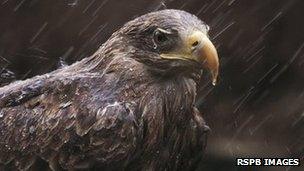Sea eagles taking lambs in Sutherland and Skye, crofters say
- Published

Sea eagles were extinct in Britain by the early years of the 20th Century
Crofters in Sutherland and on Skye have raised fresh concerns about white-tailed sea eagles taking young lambs.
Sea eagles, the UK's largest bird of prey, were extinct in Britain by the early years of the 20th Century.
David Forbes, who crofts near Kinlochbervie, said the birds had been re-introduced into an environment very different from 100 years ago.
Scottish Natural Heritage (SNH) offers payments to crofters who claim the birds have killed livestock.
A spokesman said it had not been envisaged that re-introducing sea eagles would become such an issue for crofters.
Duncan Orr-Ewing, RSPB Scotland's head of species and land management, said studies suggested that the birds took "very small numbers" of live lambs during a short period of the year.
Sutherland crofter Mr Forbes told BBC Alba fish eaten by the eagles were no longer as abundant as they were before the species became extinct in Britain.
He said populations of birds such as red throated divers and curlews around Kinlochbervie, and its harbour, had disappeared because of sea eagles.
Mr Forbes added: "This harbour didn't exist 100 years ago so there were fish - herring and haddock.
"The herring and haddock are not there any more. The fishing boats from here now fish west of Lewis to St Kilda and Rockall.
"It is a totally different environment. It is a fragile environment."
'Minimum impact'
In recent years, crofters in Wester Ross and Skye have complained of sea eagles attacking young lambs.
The results of study commissioned by SNH and published in May 2010, suggested the birds have a "minimum impact" on lambs' chances of survival.
The fortunes of selected lambs in three flocks in Wester Ross were monitored to help determine whether large numbers of livestock fall prey to the raptors.
SNH said the study of lambs in Gairloch suggested less than 2% of lambs' deaths were directly linked to the birds.
Mr Orr-Ewing said: "The sea eagle is a relatively scarce species, which brings other tangible benefits to the Scottish economy through green tourism.
"It is a legal requirement that serious damage is proven, and that alternative non-lethal solutions are pursued.
"The SNH management scheme is a more appropriate mechanism for meeting these criteria."
- Published8 June 2012
- Published14 March 2012
- Published13 December 2011
- Published2 September 2011
- Published13 August 2011